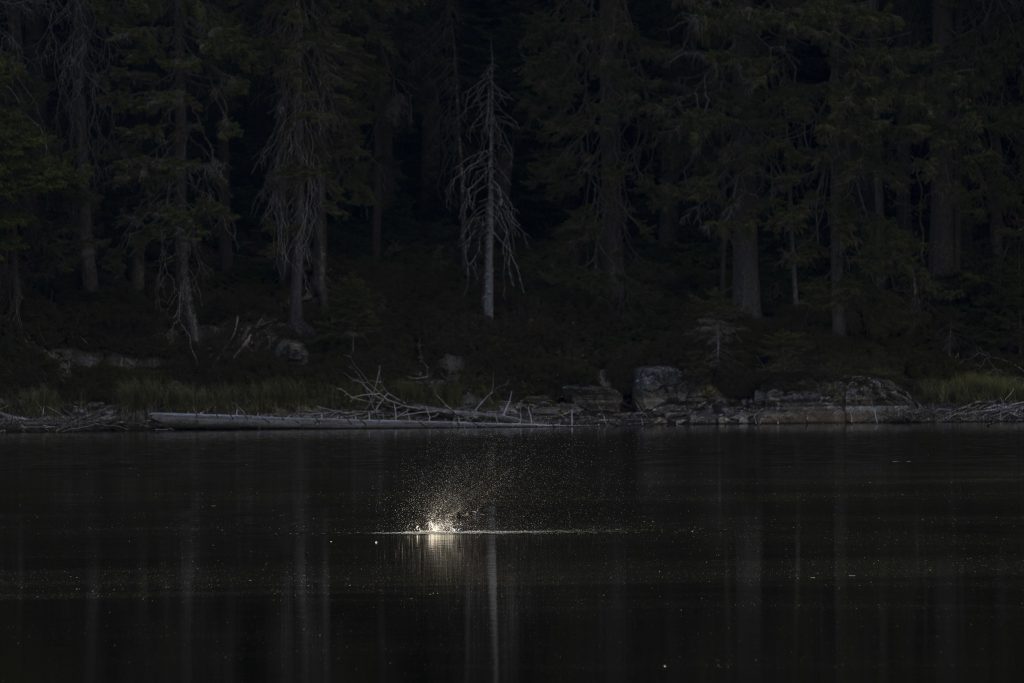In the faded forest sounds
the call of a bird
that seems meaningless
in this faded forest
and yet the rounded birdcall rests
in this interim that shaped it,
wide as the sky upon the faded forest. (R.M. Rilke)
I grew up in a rural area of western Germany, surrounded by forests, places of magic and refuge where myths, ancestral stories and childhood adventures intertwined. The bond with those landscapes shaped my understanding of nature as a source of wonder and a reflection of the cycles of life. Returning to Germany during the Covid-19 pandemic, after more than 10 years living abroad, I was confronted with a bleak reality: the forests of my childhood had changed drastically. Climate change with its high temperatures and droughts caused the bark beetle to proliferate, drying out and killing a huge percentage of the forest, exposing the fragility of human-designed plantations and the urgent need to restore natural ecosystems.
This situation, becoming aware of it, led me to explore the emotional and cultural ties that bind us to nature. Through photography, I began to document my family’s relationship with the forest, while reflecting on my own journey through motherhood. Just as the forest is governed by cycles of life and death, motherhood is a process of transformation-a small death and a rebirth of the self. I was fascinated to discover the parallels between the natural world and the human experience, especially the way social expectations have drawn us away from our primordial instincts and connections, attempting to reunify our essence with the wild world.
Ancient myths and traditions, such as the Rauhnächte-the long, dark nights of the winter solstice-remind us of the deep bond between people, nature, and the essence of womanhood. These stories challenge us to listen, to trust our instincts and to reclaim what we have lost. Renaturalization, both of landscapes and of ourselves, involves letting go of control and embracing the wild, instinctual forces that sustain life.
As forest plantations disappear, they leave behind empty spaces, blank canvases for the possibility of new life. Even in a vanishing forest, a bird’s song persists, reminding us of hope and resilience. My work seeks to honor this connection, inviting us to reclaim our ancestral bond with nature and to act with urgency in the face of environmental crisis. Like the forest, life is a cycle of loss and regeneration, and in it dwells the potential for healing and transformation.
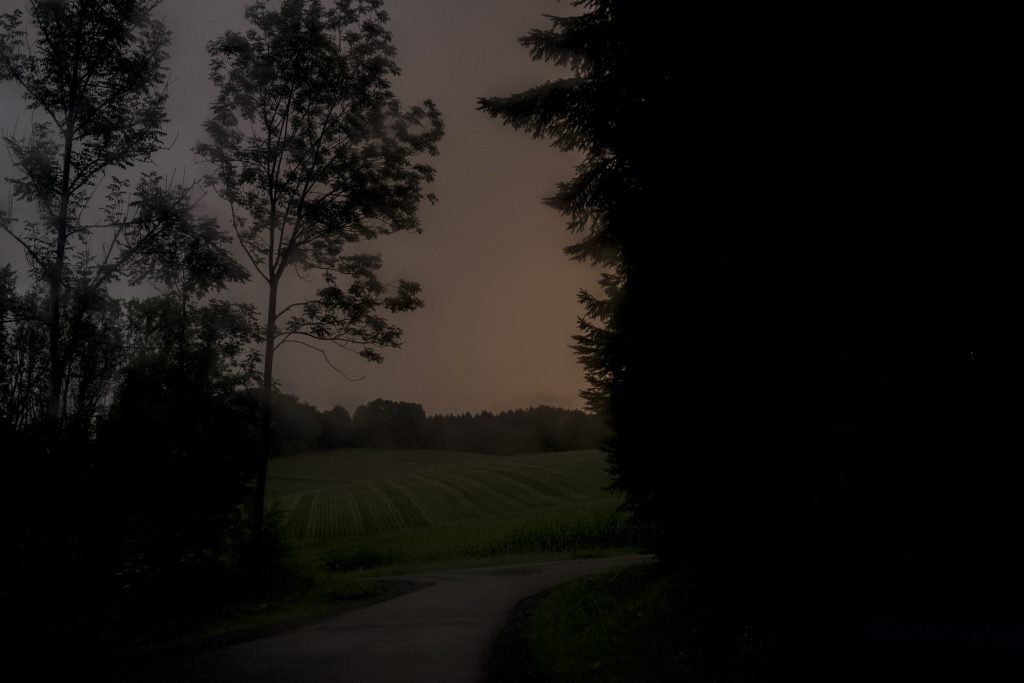
Crop fields line up a hill in the afternoon light near Engelskirchen, Germany, on August 18, 2020. Monoculture in agriculture and the wood industry, extraordinary dry summers and the lack of snow in winters have led to serious forest dieback in Germany, especially affecting the non native spruce trees but also threatening native species such as the beech and oak. According to the latest forest report of 2023, every fifth tree in Germany shows signs of damage.
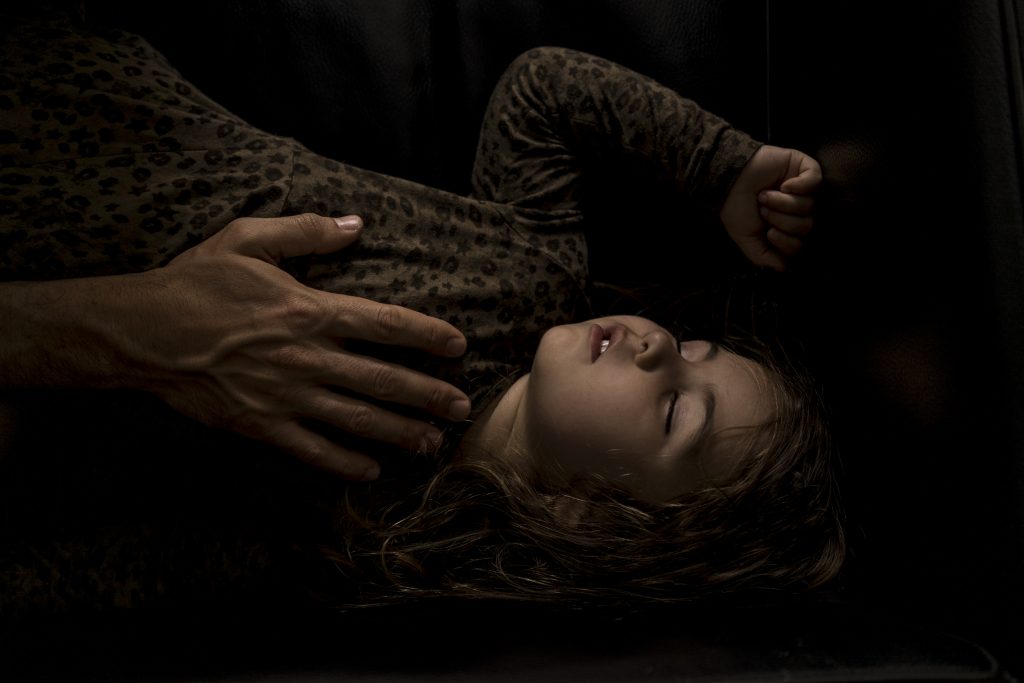
My husband comforts our 3yr old daughter Elena during a nap in Engelskirchen, Germany, on August 15, 2020. We had just arrived in Germany to stay for 3 months and escape the strict Argentine lockdown and quickly rising curve of the Covid-19 infections. We felt fragile and scared, wondering what kind of world we are leaving to our children. The connection between our own existence and a planet and ecosystem in balance had never been more visible.
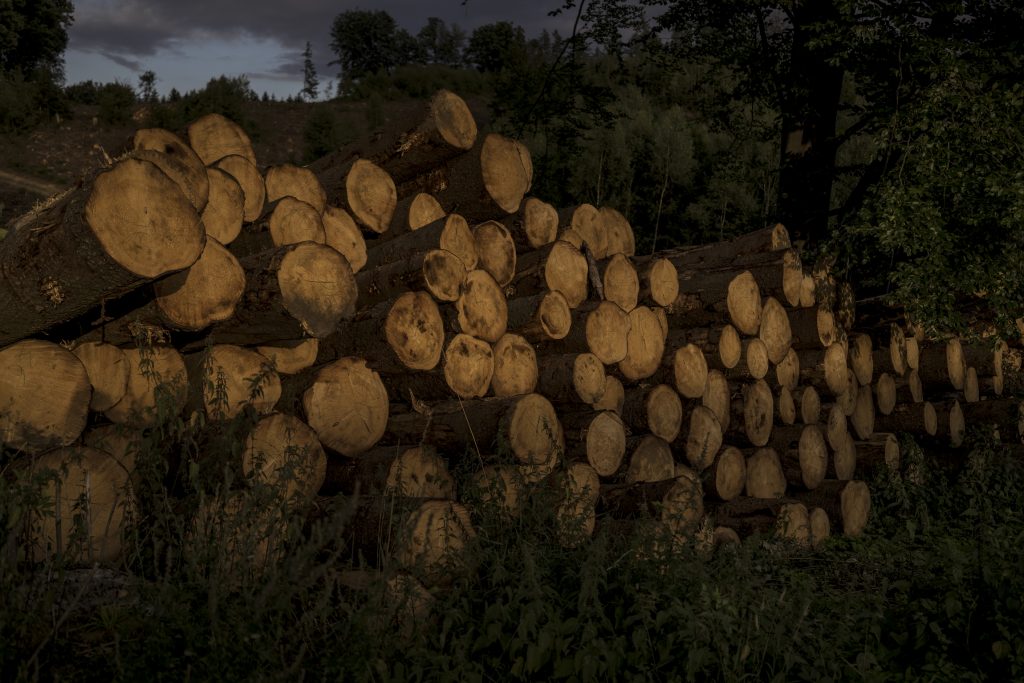
Cut spruces in Engelskirchen, Germany, on August 24, 2020. Monoculture, aggressive agriculture, and the wood industry, combined with extreme droughts and mild winters, have led to severe forest dieback in Germany. Non-native spruce trees, along with native beech and oak, are heavily affected. Infected spruce plantations, once planted by small-scale farmers as future investments for their families, had to be cut 50 years too early due to bark beetle infestations. With low wood prices and high logging costs, profits were minimal, and many trunks were shipped to China at a loss. This deforestation contributed to the devastating 2021 floods.
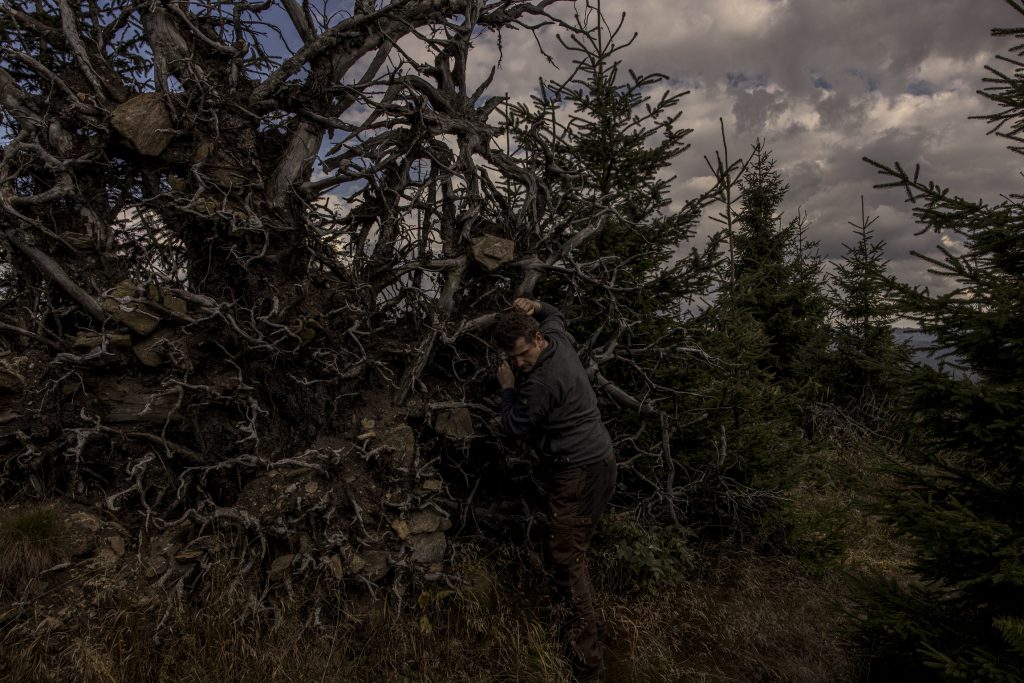
Forest scientist Martin Scholz climbs down the roots of a spruce tree that fell during a storm in the Bavarian National Park in Neuschönau, Germany, on September 9, 2022. The spruce trees are native in the region, the fallen trunk shows how shallow and broad the roots are – made for higher-lying rocky areas with a lot of humidity. The Bavarian Forest National Park covers about 242 square kilometers in the eastern part of Bavaria, Germany and is an exemplary model for conservation and biodiversity preservation. Committed to natural processes, the park doesn’t intervene – deadwood decays naturally, enabling the regeneration of the forest, despite of natural catastrophes like storms and bark beetle infections. The park has withstood critics along the years of its creation in 1970, and is home to rare species like the Eurasian lynx. Seeing with my own eyes how nature regenerates itself and with what enormous amount of creativity if we just let it, has been one of the major learnings of this project and brought me hope for the future.
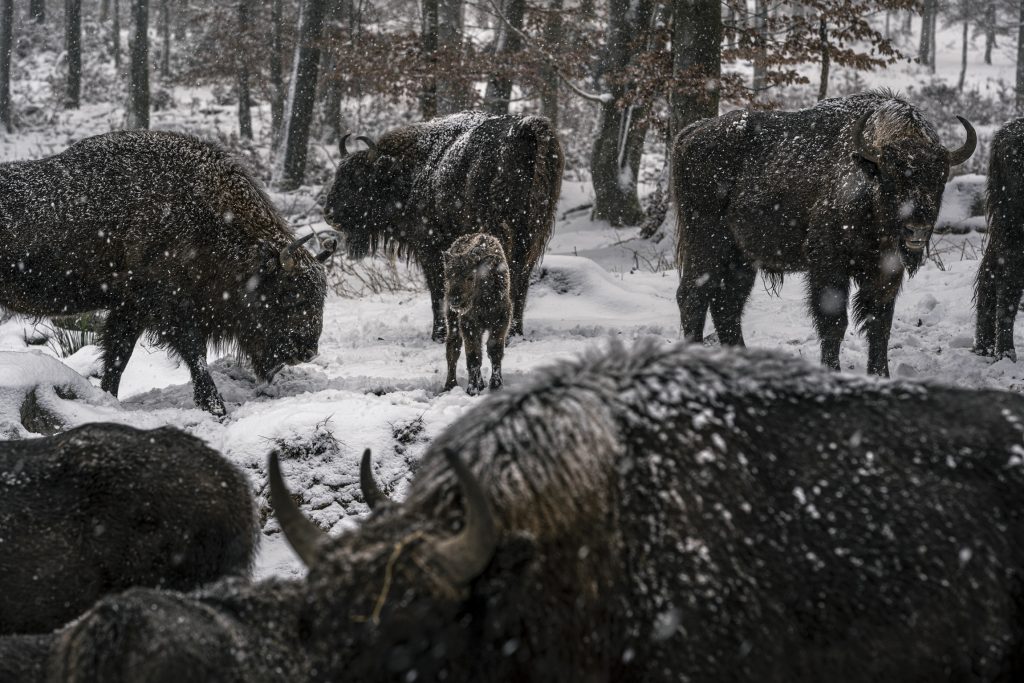
Wild European bisons, the Wisent, in the Roothaar-Mountain in Germany, on January 7, 2022. They are the only wild roaming herd in Western Europe and have grown into a population of 40 – a renaturation success story at first. But a few months after this photo, the forester responsible for the project suddenly passed away and no successor could be found – the son of the lord who had funded the project showed no interest in proceeding. The project started to face many problems, mostly of small forest farmers accusing the project of the roaming herd and destruction of their trees. For a long while reparations had been paid but with no successor there was no money left and the Wisent-Welt had to declare insolvency. The future of the project remains unclear.

My 12-year-old niece Lavie and her friend float in a water reservoir near Gummersbach, Germany, on August 14, 2020. Built in 1913 to prevent floods, supply drinking water, and provide recreation, these reservoirs have deeply reshaped the landscape. Some places reconnect us with ourselves—water, our very origin, is essential to life. Before birth, we are surrounded by it, and our brains are wired for a connection to nature, a concept known as biophilia. In today’s fast-paced world, losing this bond affects mental health, contributing to stress, anxiety, and reduced cognitive function.
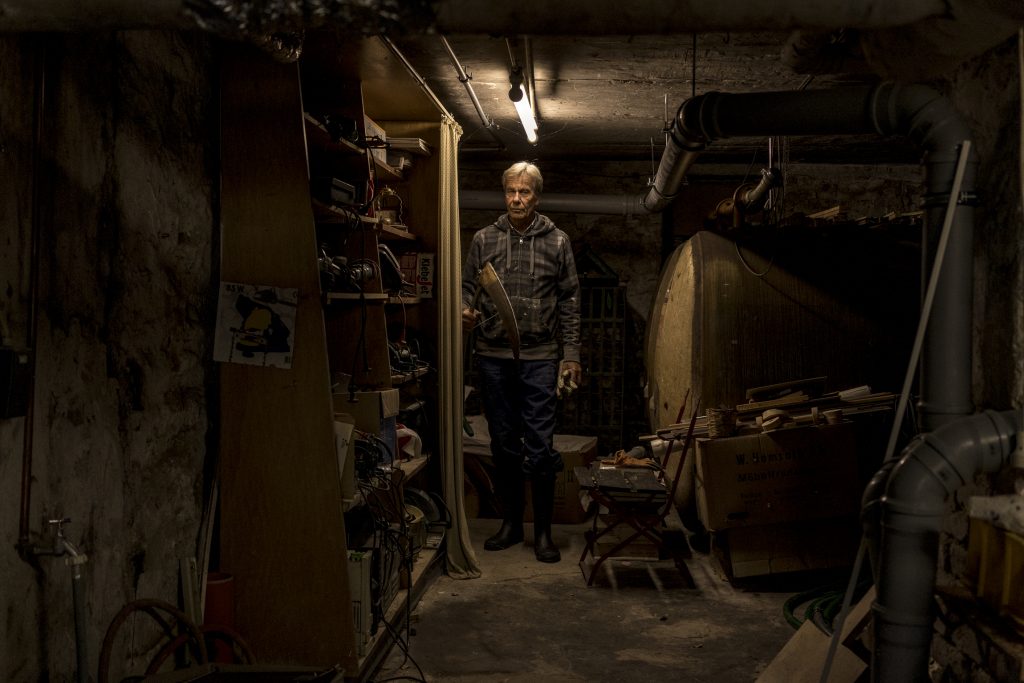
My father, Albrecht, holds a scythe to cut grass near Gummersbach, Germany, on October 15, 2020. Once a common tool of farmers, the scythe carries deep symbolic weight in mythology, often representing the cycle of life and death. In Germanic folklore, it was linked to harvest deities and even the figure of the Grim Reaper, a reminder of nature’s rhythms and impermanence. Today, those rhythms are shifting—monoculture, aggressive agriculture, and the wood industry, combined with extreme droughts and snowless winters, have led to severe forest dieback in Germany, endangering not only non-native spruce but also ancient beech and oak forests.

I nurse my newborn son Lucio in Engelskirchen, Germany, on July 22, 2021. Time seems to run differently in the endless cycle of nursing, sleeping, watching, and marvel.
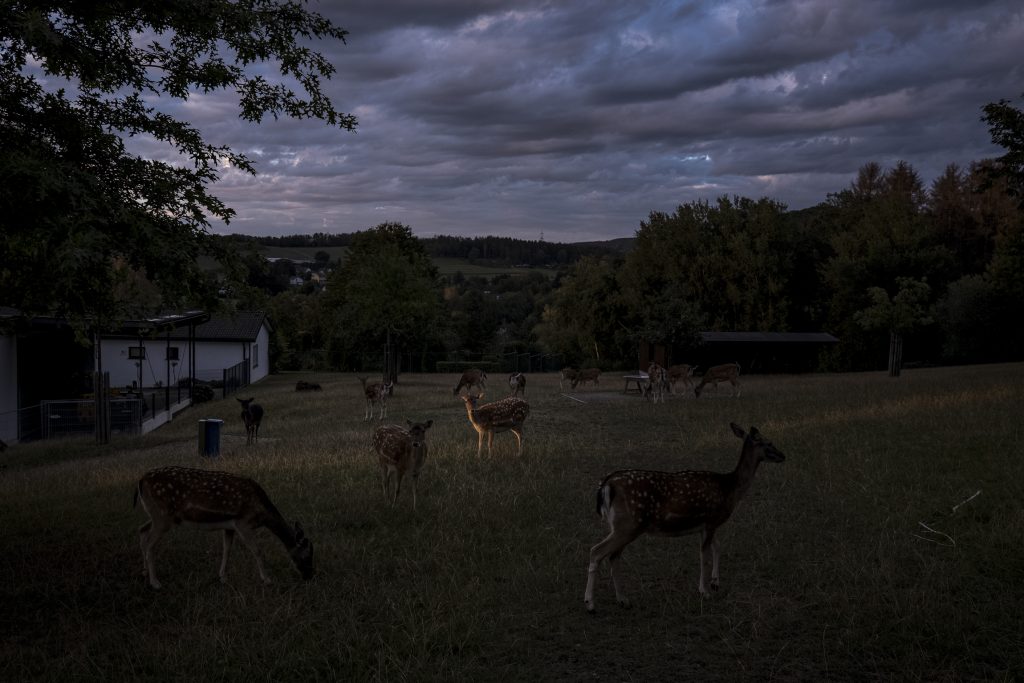
Deer stand in a meadow, bathed in the afternoon sun in Engelskirchen, Germany, on August 25, 2020. Raised for meat production and regularly fed, they don’t fear humans. Humanity’s connection to nature is revealed through the domestication of animals, the shaping of landscapes, and the control of instincts. While most animals rely on their instincts for survival, humans have learned to direct and control theirs to meet specific goals. This ability to self-regulate and make conscious decisions shapes our relationship with nature—one that is both practical and emotional, but also fraught with environmental consequences. On this afternoon, the deer stand as silent witnesses to a changing world. What will become of us when the natural forests are gone?
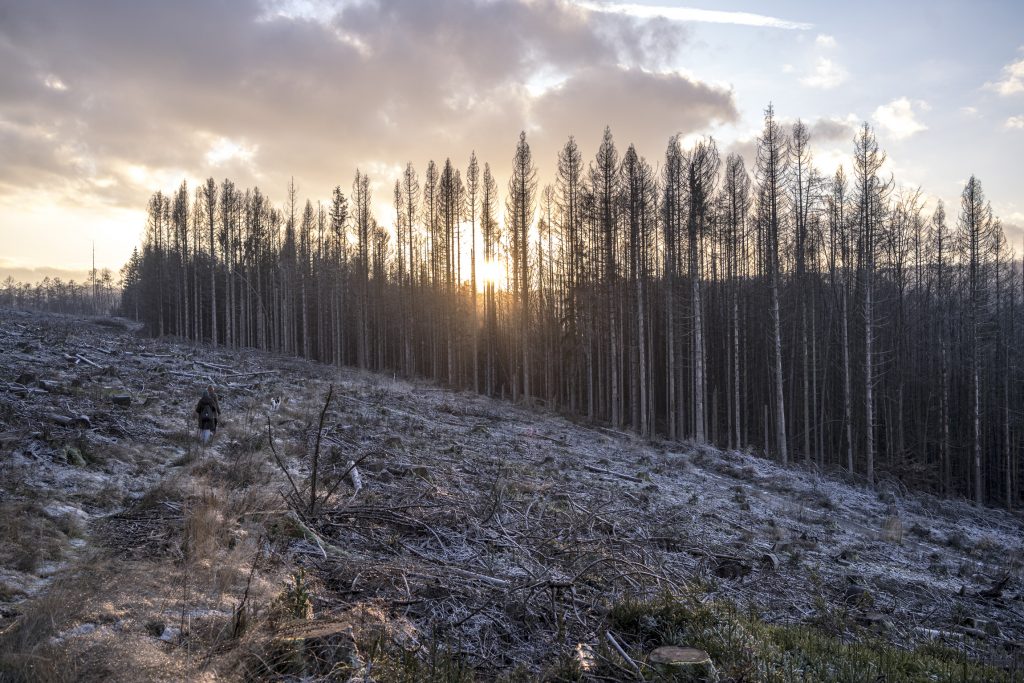
Two people walk through a clearing in Gummersbach, Germany, on January 18, 2023, with a few spruce trees of a former plantation left on the horizon. I learned, that many of the forests of my childhood had been wood plantations. The landscape changed so drastically that I started to get lost in the forest as the trees and ways of orientation were missing.
